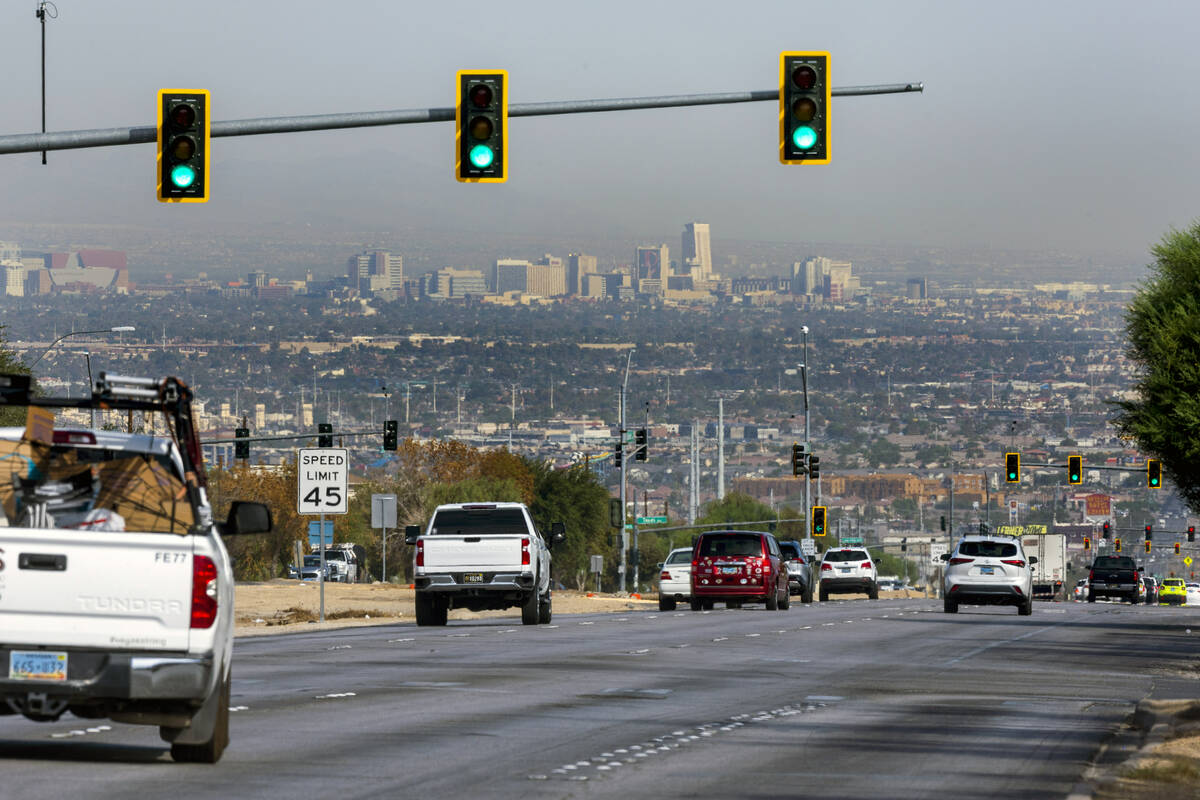Traffic camera bill could face an uphill battle in Nevada Legislature
Nevada could become the 34th state to install traffic cameras to catch speeders and drivers running red lights, but getting a bill to pass the Legislature could be an uphill battle.
Metropolitan Police Department Sheriff Kevin McMahill called for the installation of red-light and speed cameras in Las Vegas to help reduce fatalities in a city where more than 100 people have died in traffic-related incidents this year.
While a bill will be on the table in the 2025 legislative session, it’ll have to overcome what appears to be wavering support among state lawmakers who have long been resistant to the idea.
Traffic safety priority of next session
The Legislature’s Joint Interim Standing Committee on Growth and Infrastructure recently agreed to draft a bill that would allow the installation of road safety camera systems to help governments issue civil infraction traffic citations when drivers speed or run a red light.
The bill draft request was brought forward by the Nevada Advisory Committee on Traffic Safety, which was created about three years ago to advise the Legislature and governor on policy priorities.
Andrew Bennett, chair of the Nevada Advisory Committee on Traffic Safety, said automatic traffic enforcement systems have been a policy priority of the committee for the last two years, with the main goal to reduce traffic fatalities.
“The fact is that we continue to lose people on our roadways way too often,” Bennett said, and the state should look at every piece of available technology to reduce those fatalities.
Traffic cameras are just one element of a multipronged solution aiming to address traffic safety that will be on the table when the session starts in February. The standing committee on growth and infrastructure also has a second piece that will address infrastructure changes in high-impact areas to encourage safer driving, according to Sen. Dallas Harris, the chair of the interim joint committee. It also put forward two other bill draft requests, one that will allow the use of cameras to enforce school bus stop violations, and another that would establish the requirement for some high-risk drivers to be subject to drug and alcohol monitoring.
“So this is not the only piece, but if it can deter people going through a red light, if it can encourage people to slow down, hopefully that will save some lives,” Harris, D-Las Vegas, said. “We’ve just got to make sure that we’re also addressing the front end, and that’s where the infrastructure comes into play. We can’t enforce our way into safety.”
Past wavering legislative support
Implementing traffic cameras has been a long and unsuccessful effort in the Nevada Legislature. Lawmakers killed similar bills in 2005, 2007, 2009 and again in 2019 with Senate Bill 43. That bill never made it out of committee, receiving opposition from legislators on both sides of the aisle.
Legislators in 2019 questioned where revenues from the traffic citations would go and said they worried municipalities could become dependent on the revenue streams. They also expressed opposition to the burden of proof placed on drivers if someone borrowed their car and ran a red light.
Then-Sen. Scott Hammond, R-Las Vegas, warned that traffic enforcement could become unequal in the Las Vegas Valley as the county and cities decided whether to install the cameras. He also noted that many cars lack front license plates, and that drivers could be faced with two citations if a patrol officer was posted at an intersection as well as a traffic camera.
“Now it becomes an issue where you’re burdening this citizen one more time because they’ve got to go out and they prove that they already have a citation,” Hammond said in 2019. “It seems like the driver, or the owner of the vehicle, is now guilty and has to prove their innocence.”
Better chance now?
Proponents of the 2025 legislation hope it’ll have better success based on lessons learned in other states that already use traffic cameras.
Harris, D-Las Vegas, views it as a pilot program and a way to determine the impacts of such a program.
“There’s been resistance to it for good reason, and that’s why I’m hoping that with a really, really thoughtful approach, there might be an opportunity to at least test out whether these can help slow people down and save some lives,” Harris said.
The intent is to make sure funding generated by traffic camera citations will go directly toward infrastructure changes, such as speed bumps or other creative infrastructure ideas to encourage people to drive safer, she said. Harris wants to prevent local governments from becoming dependent on the funding the traffic cameras might generate. Ideally, the system would generate little revenue as it would work the traffic violators out of existence, she said.
In the 2021 session, legislators passed Assembly Bill 116, which decriminalized many traffic offenses to make them civil offenses. With that change in mind, legislators might be more comfortable authorizing the cameras.
It also has the backing of Republican Gov. Joe Lombardo, which could help sway some wary Republicans.
“I’m supportive of efforts to bring red-light cameras to Las Vegas,” the former Clark County sheriff said in a statement. “Cameras offer a valuable tool in keeping our communities safe and holding reckless drivers accountable.”
Legislators wary
While the details of the bill are still being worked out, current and possible future legislators expressed some concerns and doubts.
Assemblywoman Jill Dickman, R-Sparks, expressed opposition during the Interim Joint Committee on Growth and Infrastructure meeting in late August. Sen. Skip Daly, D-Sparks, also said he was not in favor of the installation of cameras but promised to keep an open mind on the bill relating to school bus stop violations.
Sen. Carrie Buck, R-Henderson, said in the Las Vegas Review-Journal’s online voter guide that she understands that traffic cameras could curtail increases in traffic collisions and deaths, but she thinks that other means of slowing motorists down can be more effective, such as speed bumps and traffic circles.
She also said there are concerns that the cameras could inadvertently cause more rear-end collisions as people become wary of the cameras.
Ronald “Ron” Bilodeau, a Democratic candidate for Senate District 18, said in his response to a voter guide questionnaire that he doesn’t believe it is necessary to install additional security equipment on public infrastructure.
“Most people follow and want to adhere to society’s regulations,” he wrote. “The cost and societal burden of installing additional surveillance equipment to identify the few people who deliberately violate traffic regulations may exceed the value that these cameras could bring to the community.”
Gauging local government support
Ultimately, it’ll be the Legislature’s responsibility to put guardrails on the program in place, and it will be up to cities and counties to decide whether to implement those programs. So far, municipalities’ positions on the installation of traffic cameras are vague.
Clark County Commissioner Michael Naft has been an outspoken advocate of traffic safety measures. He said has worked closely with McMahill in relation to the proposed cameras, and has discussed the technology during commission meetings.
“We know that traffic safety cameras do work,” he said. “So long as they can be implemented equitably, so long as they can be implemented in a way that protects privacy, jurisdictions should have a right to implement them.”
The commissioner said the technology can reduce “unnecessary contact” between police and drivers, and that red light cameras can eventually help reduce crashes, while speed cameras can help reduce how serious the crashes are.
Naft said that, placed “specifically” around school zones, the technology can also help the valley’s younger populations.
“So long as legislation is (implemented) both equitably and with a priority on safety, I think it would be a shame for taxpayers to not utilize the technology that we know to keep people safe, and to save money,” Naft said.
Las Vegas officials issued a statement that said the city works with the Metropolitan Police Department and other “stakeholders” to prevent deaths on valley roads.
“Any measures that can be taken to make our roads safer for pedestrians, bicyclists and motorists are seen as a priority,” the city said.
Henderson police responded to an inquiry to the city with a similar statement.
“The Henderson Police Department does support initiatives and enforcement efforts that will benefit our community members and make our roadways safer,” police said.
Henderson spokesperson Madeleine Skains said the city supports traffic safety initiatives.
“Once the bill is ready to review, we will evaluate it,” she said.
North Las Vegas deferred comment to its police department, which did not respond to an inquiry by publication time.
Contact Jessica Hill at jehill@reviewjournal.com. Follow @jess_hillyeah on X. Ricardo Torres-Cortez contributed to this report. Contact Ricardo Torres-Cortez at rtorres@reviewjournal.com.
Do traffic cameras work?
Over one-third of the traffic fatalities in Nevada are related to speed and/or aggressive driving, according to the Nevada Advisory Committee on Traffic Safety.
When road safety cameras were implemented by the Federal Highway Administration, they reduced crashes on urban principal arterials by 54 percent and injury crashes by 47 percent, and reduced speeding in school zones up to 63 percent during school hours.


















